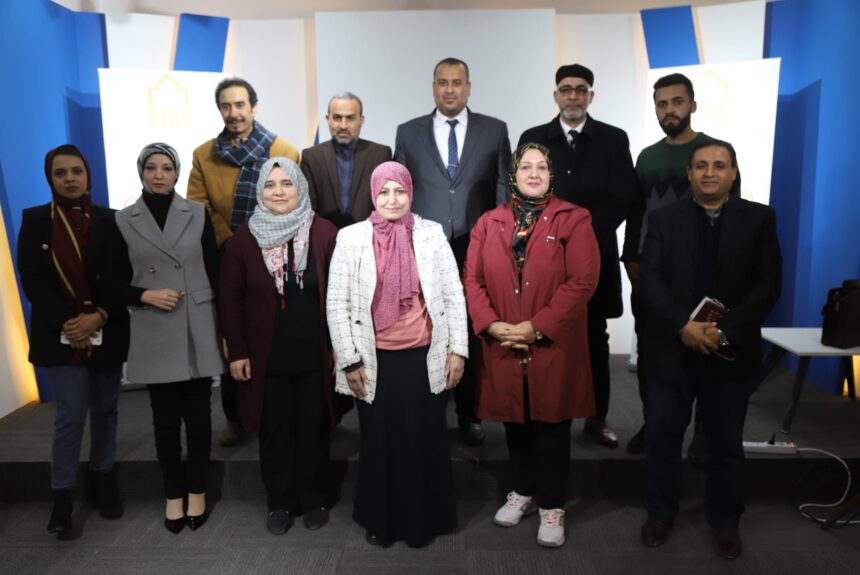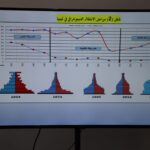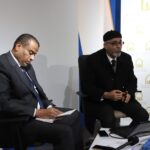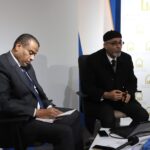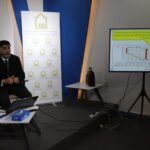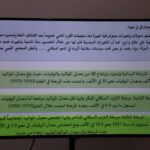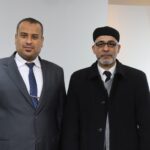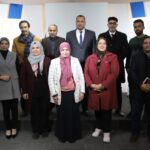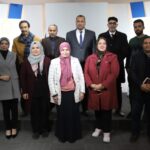Today, Wednesday, March 23, 2022 AD, in the city of Benghazi, the Libya Academy for Advanced Studies organized a dialogue session on demographic change in Libya.
This session was coordinated by Mr. Hanan Al-Falah, and the meeting was moderated by Mr. Muhammad Boubakar Al-Zidani, hosting the honorable guest, Prof. Dr. Muhammad Ibrahim Al-Hamali, member of the teaching staff, Ajdabiya University.
The meeting was opened by Mr. Muhammad Al-Zaydani by welcoming the attendees and defining the demographic transition in Libya (the factors affecting it and its impact)
The conversation moved to Prof. Dr. Muhammad Al-Hamali, speaking about the stages of the demographic transition in Libya and that the Libyan state is going through the third stage of the demographic transition.
Then he talked about the factors influencing the demographic transition, including changes in fertility rates, changes in the marital status of the population, female contributions to economic activity, and changes in the first age at marriage. He also talked about changes in mortality rates through development in health services, which in turn led to a decrease in infant mortality rates in Libya. He also discussed in his third section the effects of the demographic transition process in Libya through the change in the age structure of the Libyan population and the change in referral rates, as well as indicators of the emergence of the demographic gift and the extent to which the Libyan state benefits from this demographic gain.
After that, the conversation moved to those present, and they pointed out the necessity of developing population policies and studies on a regular basis that clarify the statistics of this change and its social and economic impacts.
At the conclusion of the meeting, Prof. Muhammad Al-Zaidani and Prof. Dr. Muhammad Al-Hamali for their contribution to the cultural season at the Libya Complex by enriching this session.
This session was coordinated by Mr. Hanan Al-Falah, and the meeting was moderated by Mr. Muhammad Boubakar Al-Zidani, hosting the honorable guest, Prof. Dr. Muhammad Ibrahim Al-Hamali, member of the teaching staff, Ajdabiya University.
The meeting was opened by Mr. Muhammad Al-Zaydani by welcoming the attendees and defining the demographic transition in Libya (the factors affecting it and its impact)
The conversation moved to Prof. Dr. Muhammad Al-Hamali, speaking about the stages of the demographic transition in Libya and that the Libyan state is going through the third stage of the demographic transition.
Then he talked about the factors influencing the demographic transition, including changes in fertility rates, changes in the marital status of the population, female contributions to economic activity, and changes in the first age at marriage. He also talked about changes in mortality rates through development in health services, which in turn led to a decrease in infant mortality rates in Libya. He also discussed in his third section the effects of the demographic transition process in Libya through the change in the age structure of the Libyan population and the change in referral rates, as well as indicators of the emergence of the demographic gift and the extent to which the Libyan state benefits from this demographic gain.
After that, the conversation moved to those present, and they pointed out the necessity of developing population policies and studies on a regular basis that clarify the statistics of this change and its social and economic impacts.
At the conclusion of the meeting, Prof. Muhammad Al-Zaidani and Prof. Dr. Muhammad Al-Hamali for their contribution to the cultural season at the Libya Complex by enriching this session.


